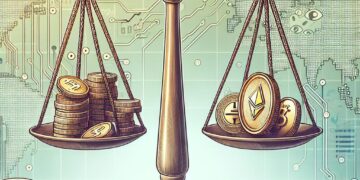Blockchain technology has emerged as a game-changer in financial planning and investment strategies. By improving transparency, security, and efficiency, blockchain can truly elevate your wealth-building efforts. But what’s all this buzz really about? Many people mistakenly believe blockchain’s only about cryptocurrencies, yet its applications extend far beyond. Understanding how this technology works empowers you to make wiser, safer financial decisions. In this blog, we’ll unpack the essentials of blockchain, debunk common myths, and present practical tips for incorporating it into your strategy. Trust us—grasping these concepts can make a massive impact on your journey to financial security.
What’s Blockchain Technology All About?
Let’s dive into the intriguing world of blockchain technology, shall we? Imagine blockchain as a massive, constantly updating digital ledger. Think of it like a giant notebook that records transactions for everyone to see but cannot be altered once entries are made. Now, how does this relate to personal finance and investment? For starters, blockchain enhances security. Picture every financial transaction locked in a digital safe that’s nearly impossible to hack. This means your investments are safer and more transparent. Furthermore, it brings efficiency—transactions are quicker and don’t rely on middlemen, cutting down costs. This can lead to significant savings over time, boosting your wealth. Whether you’re buying stocks, considering cryptocurrencies, or managing assets, blockchain provides a sturdy backbone. It’s like upgrading from a bicycle to a high-tech car in your financial journey. Embracing blockchain is not just tech-savvy; it’s financially savvy!What Makes Blockchain Technology Essential Today?
Understanding ‘Introduction to Blockchain Technology’ is crucial in today’s digital age because it forms the backbone of modern financial systems and innovations. It’s a transformative force changing how we perceive and conduct transactions, offering greater transparency and security. Awareness of blockchain’s functionality and potential impacts equips you with the knowledge to adapt in an evolving digital economy. As finance increasingly intersects with tech, grasping blockchain basics ensures you’re not left behind. It empowers you to make informed decisions, whether you’re exploring cryptocurrencies, considering investment opportunities, or simply staying updated with technological advancements in finance.How Does Introduction to Blockchain Work?
- Blockchain Creation: Imagine a group of friends sharing a notebook to record their daily expenses. Each entry is like a “block” in a blockchain. These “blocks” are linked in a chain, forming a transparent and secure ledger of transactions.
- Validation Process: Just like these friends would collectively verify an entry to ensure it’s accurate, in the digital world, miners or nodes validate transactions. This ensures they’re legitimate before adding them to the blockchain.
- Decentralised Network: Instead of a single notebook keeper, everyone has a copy. In blockchain, each participant holds the ledger, making it almost impossible for manipulations without everyone knowing.
- Investor Interaction: If you decide to buy cryptocurrency, you’re participating in this ecosystem. Your transaction gets recorded, validated, and secured within the blockchain, ensuring transparency and trust.
- Regulatory Oversight: Like parents checking in on the group’s expenses, regulators may oversee to ensure compliance and protect participants. They may set rules to prevent misuse and maintain financial stability.
Discover Blockchain: Transformative Benefits and Hidden Risks Unveiled in 10.
| Benefits | Risks/Disadvantages |
|---|---|
|
|
Exploring Real-World Blockchain Applications Across Various Industries and Sectors
- Emerging Markets in Financial Transactions: Small businesses in emerging economies use blockchain to simplify complex transactions, making trade smoother and cheaper. This change has cut down costs significantly and brought transparency. However, one small retailer in Kenya encountered issues when their system failed to update, delaying transactions and causing losses.
- Digital Identity Verification: Governments increasingly adopt blockchain for identity solutions. Estonia boasts a nationwide digital identity system based on blockchain, providing citizens secure access to services. It’s a standout success, boosting trust and efficiency in public services.
- Supply Chain Transparency: Companies like Walmart leverage blockchain to track produce from farm to shelf, ensuring authenticity. It helps prevent fraud and boosts customer confidence. Yet, a large multinational corporation faced backlash when its blockchain supply chain failed to trace contaminated lettuce on time, leading to a costly recall.
- Decentralised Finance (DeFi): Financial institutions trade assets independently using blockchain, offering new revenue streams. A startup, Aave, successfully created a decentralised lending system, providing users control over their funds and demonstrating blockchain’s potential in finance.
Comparing Blockchain Technology with Traditional Financial Systems: Key Differences
| Resource Type | Resource Name | Key Features |
|---|---|---|
| YouTube Channel | Blockchain Basics | Easy-to-understand tutorials and expert interviews that break down blockchain concepts for beginners. Visual aids enhance learning. |
| Website | Blockchain Explorers | A comprehensive guide to blockchain fundamentals, including a glossary, detailed articles, and interactive quizzes. |
| Online Course | Blockchain 101 on Udemy | Structured learning with step-by-step modules covering blockchain history, mechanics, and real-world applications. |
| Expert Voice | Andreas M. Antonopoulos | A seasoned expert known for his clear explanations and deep insights on blockchain and cryptocurrencies. Offers talk sessions and books. |
| Book | Mastering Bitcoin | Delve into technical aspects of blockchain, ideal for those who seek detailed understanding. Written by industry professionals. |
Mastering Finance for Modern Freelancers: Boost Your Wealth Wisely
– Tech-Savvy Millennials: Young adults eager to explore emerging technologies and enjoy digital innovation, who might find blockchain intriguing and a potential game-changer for future investments and careers.– Risk-Tolerant Investors: Individuals ready to take on higher risks in pursuit of significant returns, who view blockchain as an exciting opportunity to diversify their portfolios and gain exposure to revolutionary tech.
– Early Retirees: Retirees looking to stay engaged with new tech while managing their wealth. Blockchain offers a way to remain informed and potentially boost financial growth in less traditional sectors.
– Cryptocurrency Enthusiasts: Those already invested or interested in cryptocurrencies, for whom learning about blockchain can deepen understanding, enhancing their strategic approach and decision-making skills.
Stay informed about blockchain developments by following tech news, participating in webinars, and engaging in online forums to continually expand your knowledge base and investment insights.
The Future of Blockchain: Emerging Trends and Innovations
Alright, folks, as we dive into the fascinating world of blockchain, let’s peek into where it’s heading. Imagine you’re on a thrilling ride through tech’s most promising frontier. Ready?- Tech Improvements: Blockchain technology is actively evolving. We’re seeing it merge cleverly with AI for smarter applications. Interoperability among blockchain networks is getting smoother, meaning better collaboration between different systems.
- New Policies: Governments and institutions are slowly warming to blockchain, bringing in regulations that balance innovation with security. This shows they’re recognising its potential while ensuring consumer protection.
- Market Trends: The financial sector continues to be a frontrunner in blockchain adoption. However, we’re witnessing other industries, like supply chain and healthcare, embrace it for enhanced transparency and efficiency.











